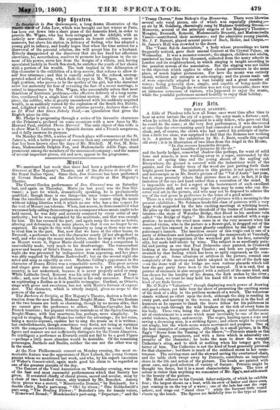so tbtittrto.
Le Satchrr (10 la Rae Quincampoix, a long drama illustrative of the frantic times of John Law, which was brought out last winter at Paris, has been cut down into a short piece of the domestic kind, in order to provide Mr. Wigan, who has been reengaged at the Adelphi, with an entirely new character. He represents an honest cobbler, coarse in manners, but above his station in delicacy of feeling, who has adopted a young girl in infancy, and fondly hopes that when the time arrives for a disavowal of the parental relation, she will accept him for a husband. Bitterly disappointed at the discovery that she has fixed her affections elsewhere, he, nevertheless, resolves to promote her happiness to the ut- most of his power, saves her from the designs of a villain, and, having speculated luckily in South Sea stock, he enriches the youth of her choice with a portion of his wealth. The task implied in the delineation of this character is the exhibition of a deep sorrow, that refuses to allow it- self free utterance ; and this is exactly suited to the refined, unexag- gerated school of acting, which finds its type in Mr. Wigan. A lady of high position, who proves to be the mother of the girl, but who dares not avow her maternity for fear of revealing the fact of a secret marriage, is raised to importance by Mrs. Wigan, who successfully solves that most thankless of histrionic problems,—the effective delivery of a long narra- tive, unrelieved by a single hint of violent motion. At the end of the piece, the cobbler, who is greatly encumbered with his suddenly acquired wealth, is as suddenly ruined by the explosion of the South Sea Bubble, and, delighted with a return to his pristine poverty, declares that—It's an III Wind that blows Nobody Good,—an ejaculation that gives the English piece its title.
Mr. Phelps is progressing through a series of his favourite characters at the Princess's, prefaced on some occasions with a new farce by Mr. Howard Paul, entitled Thrice Married. The only object of this trifle is to show Miss C. Leclereq as a Spanish duenna and a French songstress, and it fully answers its purpose. On Monday the 28th, a series of French plays will commence at the St. James's, with a better prospect of success than any enterprise of the kind that has been known since the days of Mr. Mitchell. M. Got, M. Brin- deau, Mademoiselle Delphin Fox, and Mademoiselle Adele Page, stand prominent among the members of the announced company; and the names of several important pieces, old and new, appear in the programme.


























 Previous page
Previous page